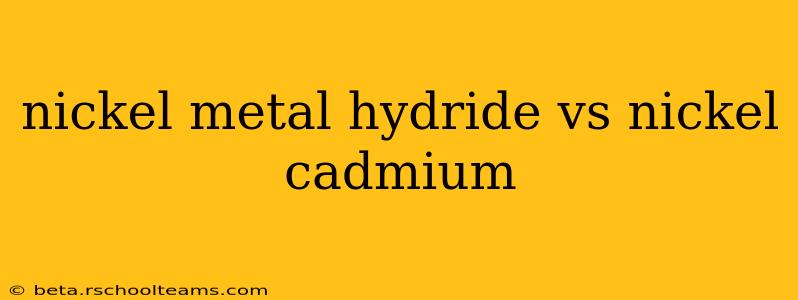Choosing the right rechargeable battery can be crucial, especially when performance, longevity, and environmental impact are important factors. This detailed comparison of Nickel Metal Hydride (NiMH) and Nickel Cadmium (NiCd) batteries will help you understand their key differences and make an informed decision.
What are NiMH and NiCd Batteries?
Both NiMH and NiCd batteries are rechargeable batteries utilizing similar electrochemical principles. However, their chemical compositions and resulting performance characteristics differ significantly. NiCd batteries use cadmium, a toxic heavy metal, as the negative electrode, while NiMH batteries replace cadmium with a hydrogen-absorbing alloy, typically a mixture of rare earth metals. This seemingly simple change has substantial consequences for their environmental impact and performance.
NiMH Advantages over NiCd
NiMH batteries boast several key advantages over their NiCd predecessors:
-
Higher Energy Density: NiMH batteries generally offer a significantly higher energy density than NiCd batteries. This means they can store more energy for the same size and weight, providing longer runtimes for your devices.
-
Lower Environmental Impact: The absence of cadmium, a toxic heavy metal, makes NiMH batteries a much more environmentally friendly option. They are also often recyclable, contributing to reduced waste.
-
No Memory Effect: A significant drawback of NiCd batteries is the "memory effect," where the battery remembers its previous discharge level and consequently reduces its capacity. NiMH batteries largely eliminate this problem, providing more consistent performance.
-
Longer Cycle Life (in some cases): While NiCd batteries traditionally had a longer lifespan in terms of charge cycles, modern high-quality NiMH batteries are catching up and often surpassing their NiCd counterparts. However, this can depend on factors like usage and charging techniques.
NiCd Advantages over NiMH (Limited)
While NiCd batteries have largely been superseded by NiMH, there are a few niche areas where they might still hold a slight edge:
-
Lower Self-Discharge Rate (in some applications): In certain low-drain applications, NiCd batteries can exhibit a slightly lower self-discharge rate, meaning they lose less charge over time when not in use. This advantage is becoming less relevant as NiMH technology improves.
-
Higher Discharge Rate Capability (in older technologies): Older NiCd batteries sometimes offered slightly higher discharge rates, useful for high-power applications. However, this difference is less pronounced with modern high-performance NiMH batteries.
Which Battery is Right for You?
The choice between NiMH and NiCd largely depends on your application and priorities:
What are the differences between NiMH and NiCd batteries?
The primary difference lies in their chemical composition. NiCd batteries use cadmium, a toxic heavy metal, while NiMH batteries use a hydrogen-absorbing alloy, making them environmentally friendlier. This difference impacts energy density, environmental impact, and the presence of the memory effect (absent in NiMH).
Which battery has a longer lifespan?
The lifespan, measured in charge cycles, used to favor NiCd. However, advancements in NiMH technology have narrowed this gap, with high-quality NiMH batteries often achieving comparable or even longer lifespans under proper use and charging.
Are NiMH batteries better than NiCd batteries?
For most applications, yes. NiMH batteries offer higher energy density, are environmentally safer, lack the memory effect, and often have comparable or even longer lifespans. However, NiCd batteries may still hold a niche advantage in specific, low-drain applications due to their slightly lower self-discharge rate.
Do NiMH batteries have a memory effect?
NiMH batteries have a significantly reduced or almost nonexistent memory effect compared to NiCd batteries. The memory effect, where a battery "remembers" its previous discharge level and reduces capacity, is a significant drawback of NiCd technology, almost entirely absent in modern NiMH batteries.
Are NiCd batteries still used today?
While largely superseded by NiMH batteries, NiCd batteries are still found in some niche applications, particularly where a very low self-discharge rate is critical and environmental concerns are less important. However, their use is declining due to their toxicity.
In conclusion, for most consumers and applications, NiMH batteries represent a clear upgrade over NiCd. Their environmental friendliness, higher energy density, and lack of memory effect make them the superior choice for modern applications. However, understanding the subtle differences outlined above will allow you to select the battery that best suits your specific needs.
